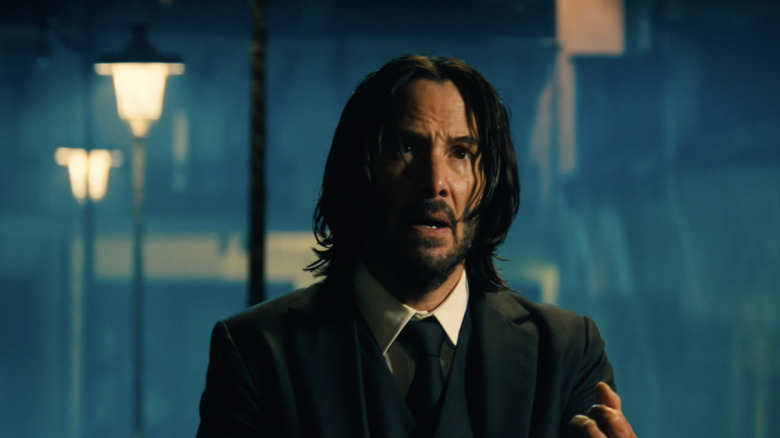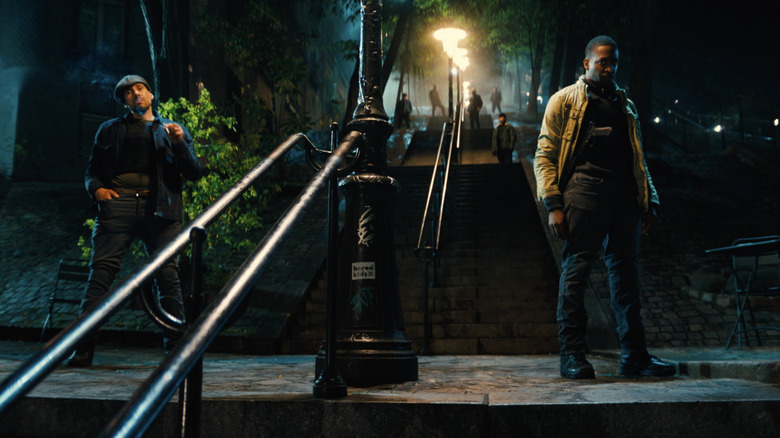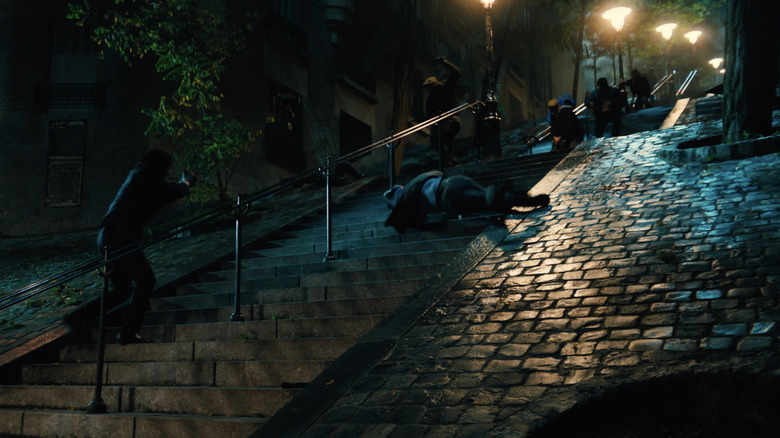The Best Scene In John Wick: Chapter 4 Recalls A Greek Myth
This article contains spoilers for "John Wick: Chapter 4."
The original "John Wick" was a fairly straightforward action-packed affair that didn't necessarily offer up any deep meaning or contain some profound philosophical message. The casting of Keanu Reeves, coupled with innovative fight choreography, was enough to make a simple revenge tale seem a little more profound than it actually was. With the introduction of the assassin's hotel, the Continental, a chaotic world was suddenly given some parameters and a set of rules. It was just enough to make it appear as though there was much more going on underneath the surface.
Now, ten years on, "John Wick: Chapter 4" has crafted a mythic construct around the character of John Wick as the man who can't seem to outrun or out-shoot his past. For all his efforts, the body count keeps going up and Wick gets farther and farther away from home, both literally and figuratively. He's forced to traverse the world, visiting exotic locales that continue to place obstacles and nefarious villains in his path. If that story is starting to sound familiar, it's because it closely resembles Homer's epic poem, "The Odyssey," a connection that "John Wick: Chapter 4" director Chad Stahelski is very well aware of, telling /Film's Vanessa Armstrong:
"... when you really get into Homer's works and you're following Odysseus, look at the trials he went through, or Hercules' tasks, or anything like that. What makes him so memorable? Why are we still talking about it thousands of years later? The sirens, the minotaur, or the Golden Fleece or whatever. They're interesting, they're very unique, and they help paint the picture of the task."
John Wick and the myth of Sisyphus
The tasks John Wick has to complete in this latest chapter are seemingly unsurmountable, even for the world's greatest warrior. In one of his last trials, Wick must reach the Sacré Coeur before sunrise by traversing a seemingly endless staircase. A plethora of henchman stand in his way that keep spawning and attacking from the high ground position while Wick keeps methodically working his way up hundreds of steps. Once he gets to the top, Chidi (Marko Zaror) — the Marquis' (Bill Skarsgård) head of security — boots him back down the staircase where Wick has to repeat the same challenge all over again.
The scene recalls another great Greek myth, that of Sisyphus who was forced to push a boulder up a hill for eternity. In the classic version of the story, the character of Sisyphus is punished by Hades himself for attempting to outsmart Zeus and cheat death. For his sins, Hades puts a spell on the giant rock that causes it to roll back down the hill every time poor Sisyphus makes it to the top. The story has become a parable for a laborious, impossible task that is ultimately rendered pointless despite great effort.
The full staircase sequence in "John Wick: Chapter 4" parallels the story of Sisyphus, exemplifying the subtle nods and references to Greek mythology that are sprinkled throughout the entire series. It's a painful reminder of just how much Herculean effort John Wick has to manifest in order to overcome such incredible odds. It's both inspiring and endlessly exhausting at the same time.
One must imagine John Wick happy
Whether or not Wick's mission to free himself from the criminal underworld will ultimately wind up being just as meaningless as Sisyphus' eternal task is up for debate. From battling the Tarasov family in the original to the authoritarian rule of the Marquis as de facto leader of the High Table, all John Wick has wanted to do is just go back to being John. Remember him as a loving husband first, not as the brilliant killer known as the Baba Yaga. To get even more philosophical for a second, one question needs to be addressed that ties back into the story of Sisyphus. Is John Wick actually happiest when he's in the midst of murder and mayhem? Is he most content when he makes the impossible possible? Reaching the top of those Paris stairs to reach the Sacré Coeur could not have been done by anyone else. In that moment when Wick picks himself back up again, he's never been more of a hero. It's precisely why we love him and why the "real" John Wick stands back up to race up the staircase all over again.
In Albert Camus' essay, "The Myth of Sisyphus," the French philosopher theorized that the story of Sisyphus endlessly rolling that boulder up the hill is a metaphor for the absurdity displayed in the lives of most men. Camus goes on to say that the physical act of doing is what creates contentment, not finally accomplishing your goal. Camus wrote, "The struggle itself to the heights is enough to fill a man's heart. One must imagine Sisyphus happy."
For four chapters now, John Wick has been perpetually rolling that boulder up the hill. It remains to be seen if he'll be content leading a sedentary life or if he's truly happiest when he's forever on the attack.
"John Wick: Chapter 4" hits theaters on March 24, 2023.


